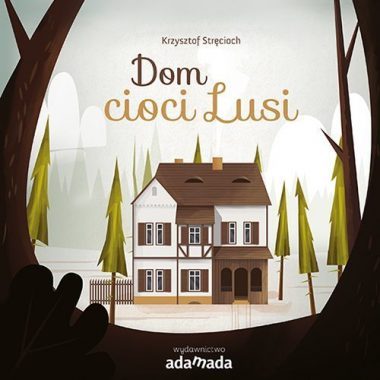Author: Krzysztof Stręcioch
Illustrator: Krzysztof Stręcioch
Year: 2018
Publisher: Adamada
Place of publication: Gdańsk
Pages: 32
ISBN: 9788381180375

“My name is Wandzia, Zosia, and Basia. I am going to tell you my story”. These are the opening words of Krzysztof Stręcioch’s Holocaust story aimed at the youngest reader group (starting at five years old). The narrative sees a little Jewish girl uprooted from a calm life with her parents and transported to the ghetto, where she observes the dramatic situation of Jews condemned to death. Luckily, her parents manage to smuggle Wandzia-Zosia-Basia back to the “Aryan” side of the ghetto wall, where she finds shelter in the eponymous home of Aunt Lusia. Having been especially trained, the girl assumes a new identity and continues to hide from the constant, looming threat. The protagonist manages to see the end of the war, and finishes her story with the moving words: “My name is Wanda, Zofia, Barbara. I am Polish. I am a Jew. I would not like my story to ever be repeated”.
Aunt Lusia’s Home is a story on the Holocaust directed at a very young reader group. A short, simplified narrative from the perspective of a little girl can help introduce this difficult subject to young children. It will not upset the reader by any horrors or violence whatsoever, and the short plot told in simple sentences is accessible to young children. At the same time. Stręcioch has included researched historical occurrences, such as concealing one’s identity or “playing hide-and-seek”, thereby offering a temperate but accurate narrative on the Holocaust.
Bibliography:
- Karczewska, A., Pamięć i empatia. O dziecięcej literaturze Zagłady, [w:] Pamięć o Zagładzie w polskojęzycznej i niemieckojęzycznej literaturze autorek i autorów drugiego oraz trzeciego pokolenia post-Szoah / Das Gedächtnis an die Shoah in der polnischen und deutschsprachigen Literatur von Autorinnen und Autoren der zweiten und dritten Post-Shoah-Generation, red. I. von der Lühe, S.J. Żurek, Lublin 2019, s. 265–300;
- Rybak, K., Stosunki polsko-żydowskie i Zagłada w polskiej literaturze dziecięcej XXI wieku, [in:] Stosunki polsko-żydowskie, vol. 2, Kultura. Literatura, sztuka i nauka w XX wieku, ed. Z. Trębacz, Warszawa 2020, pp. 171–187 (p. 177, fn. 21);
- Rybak, K., Zagłada i ideologia w polskiej literaturze dziecięcej XXI wieku, „Narracje o Zagładzie”, no. 1(7), 2021, pp. 155–173 (p. 162, 164);
- Rybak, K., Obrazowanie Zagłady. Narracje holokaustowe w polskiej literaturze XXI wieku dla dzieci i młodzieży, Warszawa 2023;
- Szyguła, A., Dom cioci Lusi, „Ryms. Kwartalnik o książkach dla dzieci i młodzieży”, no. 33, 2018, p. 44.